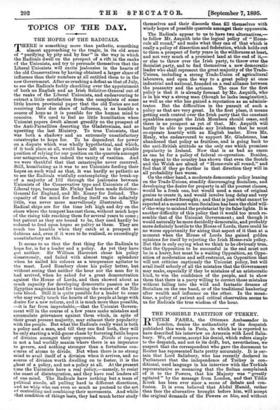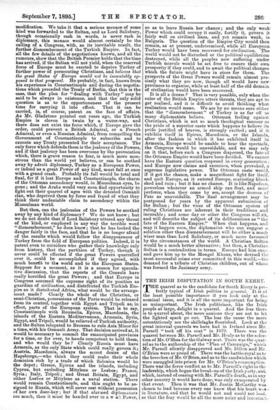THE POSSIBLE PARTITION OF TURKEY. R ITSTEM PASHA, the Ottoman Ambassador
in, London, denies the authenticity of the despatch published this week in Paris, in which he is reported to- have described his interview on Armenia with Lord Salis- bury. We, of course, accept his denial, which refers simply to the despatch, and not to its drift, but, nevertheless, we suspect that the correspondent who gave the document to Reuter has represented facts pretty accurately. It is cer- tain that Lord Salisbury, who has recently declared in Parliament that the independence of Turkey is con- ditional, used language in his interview with the Turkish, representative so menacing that the Sultan complained of it to the Powers, that his Majesty was "greatly agitated " by the message from London, and that Yildiz Kiosk has been ever since a scene of debate and con- fusion. It is even believed that Abdul Hamid, rather than face the alternative brought before him, will accept the original demands of the Powers en bloc, and without 'modification. We take it that a serious menace of some -kind was forwarded to the Sultan, and as Lord Salisbury, though occasionally rash in words, is never rash m diplomacy, this menace would almost certainly be the calling of a Congress, with, as its inevitable result, the further dismemberment of the Turkish Empire. In fact, all the few details of the negotiations known, and all the rumours, show that the British Premier holds that the time has arrived, if the Sultan will not yield, when the reserved force of Earope must be exerted to deprive Turkey of further power of persecuting Christians, and believes that the great States of Europe would not be immutably op- posed to that proposal. He probably, in fact, knows from his experience in Constantinople and during the negotia- tions which preceded the Treaty of Berlin, that this is the case, that the plan for "dealing with Turkey" may be said to be always in existence, and that the only solid question is as to the opportuneness of the present time for carrying it into effect. That it can be carried, is, of course, patent on the face of affairs. As Mr. Gladstone pointed out years ago, the Turkish Empire is cloven in twain by a water-way, and there does not exist the force which, if Europe gave the order, could prevent a British Admiral, or a French Admiral, or even a Russian Admiral, from compelling the Government of Constantinople to subscribe and to execute any Treaty presented for their acceptance. The only force which defends them is the jealousy of the Powers, and if that jealousy has been overcome by the provocation which, there is grave reason to fear, is much more mon- strous than the world yet believes, or can be soothed away by adroit diplomacy, Turkey as a European Power, or indeed as a great Power of any kind, must fall at once with a grand crash. Probably its fall would be total and final, for if it lost Europe and Constantinople, the charm of the Ottoman ascendency would, in Mussulman eyes, be gone ; and the Arabs would very soon find opportunity to fight out their quarrel of ages with the detested Osmanli clan, who deprived them by force and fraud of what they think their undeniable claim to ascendency within the Mussulman world.
But then, can the jealousies of the Powers be soothed away by any kind of diplomacy ? We do not know ; but we do not doubt that if Lord Salisbury uttered any threat of the kind, or employed in any way the terrible word " dismemberment," he does know ; that he has looked the danger fairly in the face, and that he is no longer afraid of the results which would follow the disappearance of Turkey from the field of European politics. Indeed, it is patent even to outsiders who gather their knowledge only from history, that the partition of Turkey, though it never could be effected if the great Powers quarrelled over it, could be accomplished if they agreed, with much benefit to the world and to the European States. Suppose for a moment, as it is a season for specula- tive discussion, that the reports of the Consuls have really horrified the great Powers ; and that Europe in Congress assumed the supreme right of its position as guardian of civilisation, and distributed the Turkish Em- pire as it distributed Africa, what would be the arrange- ment made ? Clearly the whole of the Christian, or semi-Christian, possessions of the Porte would be released from its control, together with Egypt and Tripoli as, in effect, parts of the European system. That is to say, Constantinople with Roumelia, Epirus, Macedonia, the islands of the Eastern Mediterranean, Armenia, Syria, Egypt, and Tripoli, would be relieved of Turkish authority, and the Sultan relegated to Browse to rule Asia Minor for a time, with his Osmanli Army. That decision arrived at, it would be necessary to commit the emancipated provinces for a time, or for ever, to hands competent to hold them, and who would they be ? Clearly Russia must have Armenia, as the only State which could really govern it; Austria, Macedonia, always the secret desire of the Hapsburgs,—who think they could make their whole dominion rich by a trade of which Salonica would be the depot; Greece, Epirus and the islands, including Cyprus, but excluding Mitylene or Lesbos; France, Syria; Italy, Tripoli ; and Great Britain, Egypt, and either Lesbos or Mitylene as a naval station. There would remain Constantinople, and this ought to be as- signed to Russia, which will never rest without possession of her own door-key ; but if that alarmed diplomatists too much, then it must be handed over to a war Power, so as to leave Russia her chance ; and the only weak Power which could occupy it easily, fortify it, govern it fairly well on civilised lines, and yet remain weak, is Bulgaria. The question of the Empire City would then remain, as at present, undetermined, while all Europeam Turkey would have been recovered for civilisation. The world would not be disturbed or the political equilibrium destroyed, while all the peoples now suffering under Turkish misrule would be set free to ensure their own prosperity if they could, and to await the political changes which the future might have in store for them. The prospects of the Great Powers would remain almost pre- cisely what they are now, though all would have new. provinces to organise, while at least half of the old domain of civilisation would have been recovered.
It is all a dream ? That is very possible, only when the ruler of the British Empire utters threats, they are apt to get realised, and it is difficult to avoid thinking what realisation would mean. We are by no means sure either that the " dismemberment" of Turkey is as far off as many diplomatists believe. Ottoman feeling against Christians, which is not so much theological rancour as the pride of a superior caste which happens to believe its pride justified of heaven, is strongly excited ; and if it exhibits itself in Epirus, Macedonia, or the Islands, after the fashion in which it has exhibited itself in Armenia, Europe would be unable to bear the spectacle, the Congress would be unavoidable, and we may rely on it that, before such a Congress dispersed, the fate of the Ottoman Empire would have been decided. We cannot have the Eastern question reopened in every generation ; and Europe now claims and exercises, when provoked, a supreme legislative power. The Ottoman caste would, if it got the chance, make a magnificent fight for itself, and quit Europe, as it entered Europe, scattering blood- shed and ruin ; but it has no chance. It is like Napoleon, powerless wherever an armed ship can float, and must, perforce, when they come by sea, accept the decrees of Fate as unavoidable. The final arrangement may be postponed for years by the apparent submission of the Sultan ; but the vices of the Ottoman system of ruling Christians are inherent in their traditions and incurable ; and some day or other the Congress will sit, and will describe the subject of its deliberations as " the fate of the Eastern Empire." When that happens, and may it happen soon, the diplomatist who can suggest a solution other than dismemberment will be either a much wiser man than Lord Salisbury, or much more favoured by the circumstances of the world. A. Christian Sultan. would be a much better alternative ; but then, a Christian Sultan is a contradiction in terms. Europe had him once, . and gave him up to the Mongol Khans, who devised the- most successful crime ever committed in this world,—the demand for a tribute of Christian children, out of whom was formed the Janissary army.



































 Previous page
Previous page